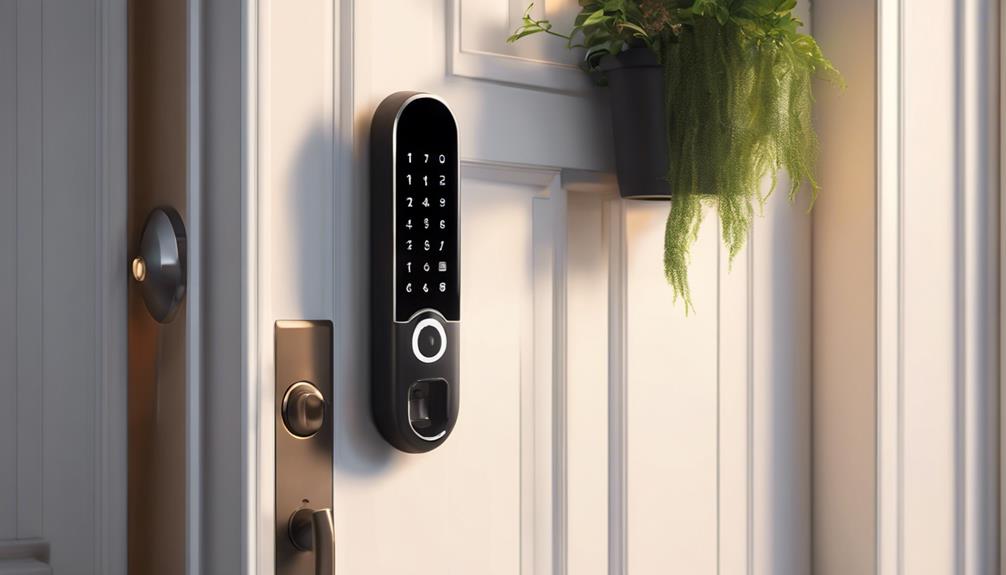Smart locks offer a seamless blend of convenience and control that's hard to overlook. You can manage access from your smartphone, allowing keyless entry and the ability to grant temporary codes to guests. This means no more fumbling for keys or worrying about giving out duplicates. Plus, their monitoring features send alerts for unusual activity, enhancing your peace of mind. While traditional locks have their merits, the remote access, activity logs, and customizable codes of smart locks add an extra layer of security. If you're curious about their long-term value and user experiences, there's more to discover.
Key Takeaways
- Smart locks provide keyless entry, eliminating the hassle of carrying physical keys and enhancing convenience for everyday access.
- Remote management allows homeowners to control locks from anywhere, granting or denying access easily for guests or service providers.
- Monitoring features track entry and exit times, providing homeowners with insights into their property's security and activity patterns.
- Instant alerts for tampering attempts and unusual activity enhance security, offering peace of mind while away from home.
- Although there are initial and ongoing costs, the long-term value in convenience and security often outweighs the investment.
Understanding Smart Locks
In today's tech-savvy world, understanding smart locks is essential for anyone looking to enhance their home security. You might wonder how smart locks differ from traditional locks. While traditional locks require a physical key, smart locks offer advanced features like keyless entry, remote access, and customizable user codes.
Additionally, many smart locks also integrate with home automation systems, allowing for even greater control and convenience. With smart lock convenience, you're not just improving security; you're also simplifying your life.
One of the standout smart lock features is the ability to control your lock from anywhere using your smartphone. This means you can grant access to friends, family, or service providers without needing to be home.
Imagine the peace of mind you'll have knowing that you can lock or open your door on-the-go. Weighing the benefits and drawbacks of smart locks becomes even more important as you consider these features.
When you compare smart vs traditional lock control, the benefits become even clearer. Traditional locks can be cumbersome, especially when you're juggling groceries or kids. Smart locks eliminate that hassle, offering a seamless user experience.
Convenience of Smart Locks
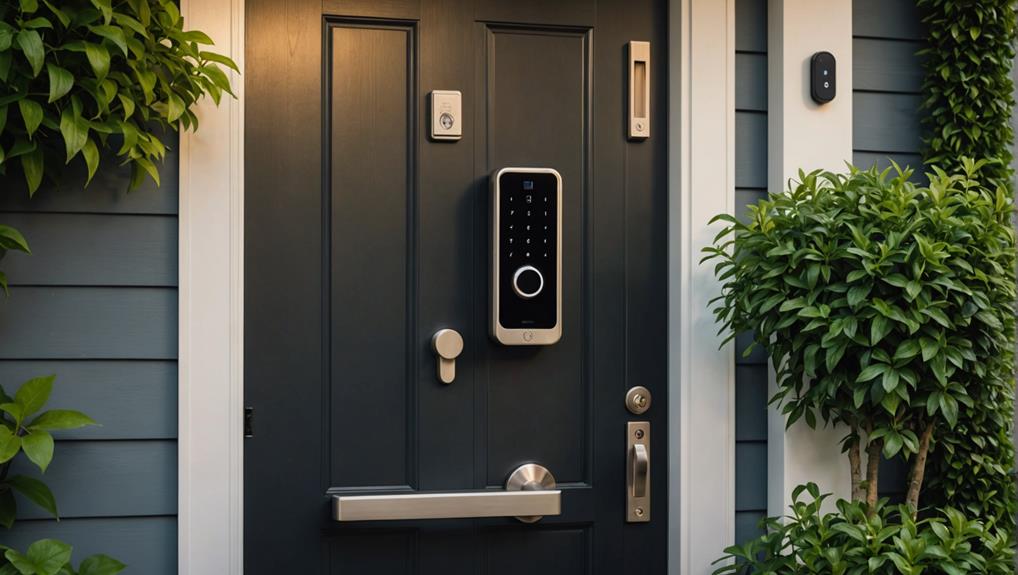
Smart locks truly shine when it comes to convenience, making everyday life easier for homeowners. Imagine being able to open your door with just your smartphone or a code, rather than fumbling with traditional keys. This lock technology convenience allows you to grant access to family, friends, or service providers without needing to be physically present.
Additionally, smart locks often feature advanced security options that can help mitigate vulnerabilities found in traditional locks, such as security features comparison that enhance overall safety.
With a smart lock remote control, you can even let someone in while you're away, ensuring they can handle deliveries or maintenance without disrupting your day. This flexibility not only saves you time but also enhances your ability to serve others seamlessly.
Additionally, smart locks often come with features like temporary access codes, which means you can provide a friend or neighbor access for a specific time without compromising your security.
The smart lock benefits extend beyond just easy entry; they also offer peace of mind. You can monitor who enters and exits your home, and receive alerts if someone tries to tamper with your lock.
Ultimately, smart locks simplify your life, allowing you to focus on what truly matters—serving those around you with ease and confidence.
Enhanced Control Features
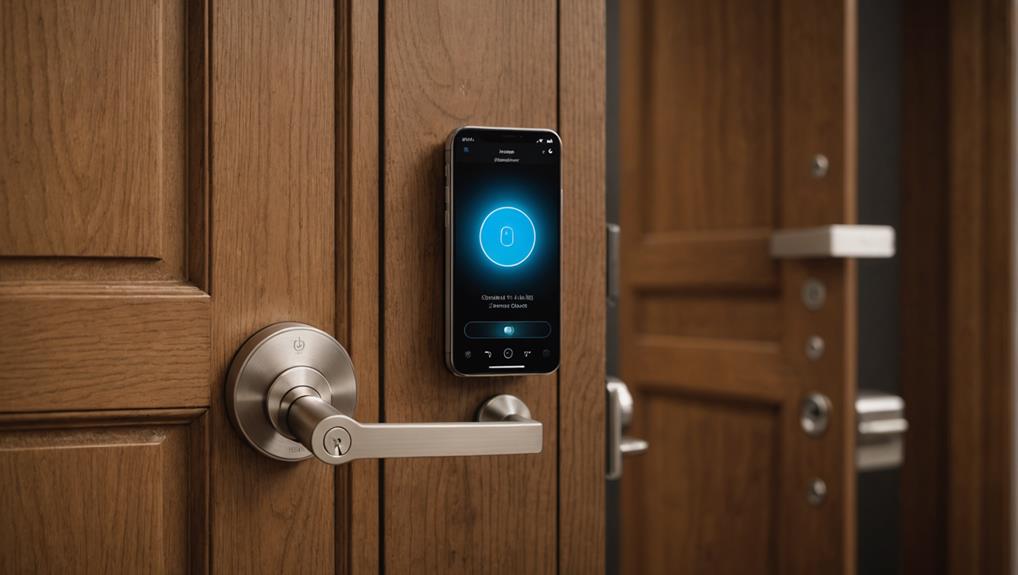
With smart locks, you gain remote access capabilities that let you control your door from anywhere.
This seamless integration of technology provides a level of convenience that traditional locks simply can't match, as highlighted in the discussion of hybrid lock systems that combine smart and traditional lock features.
You can also manage who's access, adding or removing users as needed.
This level of control gives you peace of mind and flexibility like never before.
Remote Access Capabilities
While you may be at work or on vacation, remote access capabilities of smart locks let you control your home's security from anywhere. Imagine being able to check if you locked your door or granting access to a neighbor while you're miles away. This feature directly addresses traditional lock drawbacks, allowing you to feel secure without the hassle of physical keys.
| Feature | Benefit |
|---|---|
| Control from Anywhere | Peace of mind for you and your loved ones |
| Instant Alerts | Immediate notification of suspicious activity |
| Temporary Access | Help a friend or service provider without hassle |
| Activity Logs | Track who enters and exits your home |
With remote access, you can guarantee your home is safe, even when you can't be there. You're not just enhancing your own convenience; you're also serving the needs of those who depend on you. You can assure that family members or trusted friends can access your home in emergencies or when you're away, making smart locks a valuable addition to any household.
User Management Options
Many homeowners appreciate the flexibility that user management options provide when it comes to smart locks.
These features allow you to tailor access for each individual, ensuring that everyone who needs to enter your home can do so with ease while maintaining security.
Here are four key user management options that enhance your control:
- Custom User Codes: You can create unique access codes for family members, friends, or service providers. This way, you know exactly who's entering your home.
- Temporary Access: Grant time-limited access for guests or service personnel. Set a specific duration for their access, and it'll automatically expire.
- Activity Logs: Monitor who's entered or exited your home and when. This feature is essential for keeping track of visitors and ensuring safety.
- Remote Management: You can manage user access from anywhere, giving you peace of mind when you're away.
Remote Access Capabilities
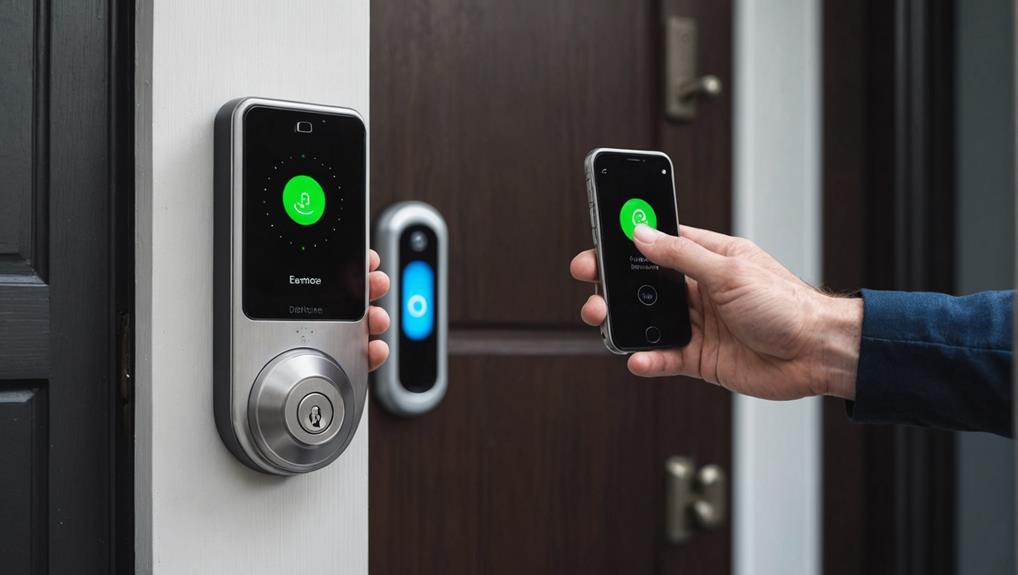
With remote access capabilities, you can enjoy the convenience of keyless entry right from your smartphone.
This technology allows for easy re-keying vs. reprogramming, enabling users to manage their locks in various ways.
Lock management apps allow you to control who enters your home, even when you're not there.
This level of access not only enhances security but also provides peace of mind.
Keyless Entry Benefits
Keyless entry systems offer significant benefits, particularly through their remote access capabilities.
Imagine being able to manage your home's security from anywhere, ensuring peace of mind while you serve others. With these systems, you can easily grant access to family or friends without being physically present.
Here are some key advantages:
- Real-Time Access: You can open or lock your door instantly from your smartphone, making it easy to help someone in need.
- Temporary Codes: Share temporary access codes with guests or service providers, ensuring they can enter when necessary without compromising your security.
- Notifications: Receive alerts whenever someone enters or exits, allowing you to stay informed about who's coming and going.
- Remote Monitoring: Check the status of your lock anytime, ensuring your home remains secure while you're away serving your community.
Lock Management Apps
Lock management apps revolutionize the way you control access to your home. With these apps, you can manage your smart locks remotely, ensuring that you can grant or deny entry to family, friends, or service providers without needing to be physically present. This feature is particularly helpful when you want to give someone temporary access while you're away or if you need to help a neighbor.
Here's a quick overview of some key features available in lock management apps:
| Feature | Benefit | Example Use Case |
|---|---|---|
| Remote Access | Grant access from anywhere | Letting in a friend |
| Access Logs | Monitor who enters/exits | Checking service provider access |
| Custom Access Codes | Create unique codes for guests | Temporary codes for visitors |
| User Management | Add/remove users easily | Managing family members' access |
| Notifications | Get alerts for lock activities | Staying informed on access |
Traditional Locks Overview
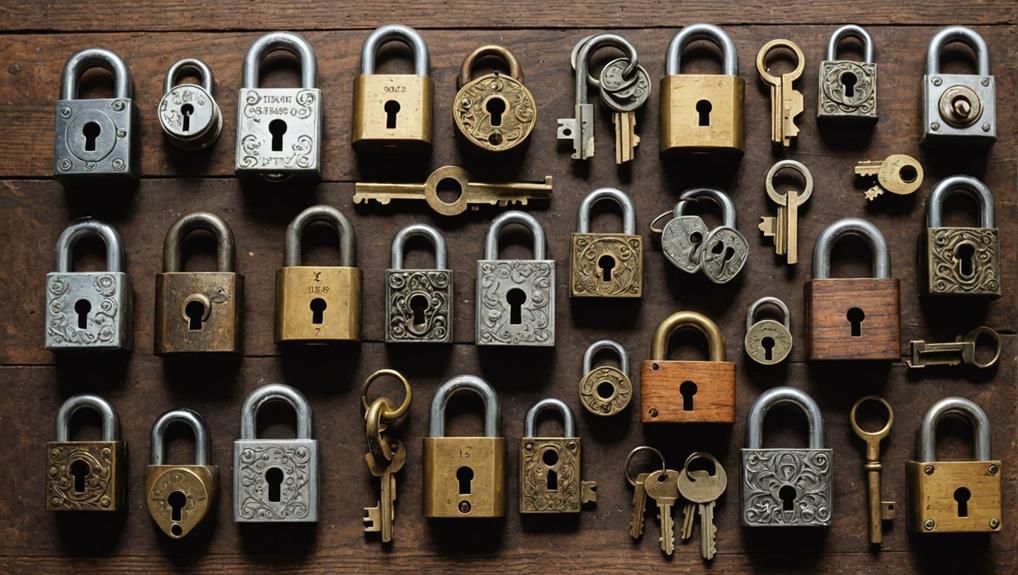
Traditional locks are commonly seen as the foundation of security in homes and businesses. They've been around for ages and offer a sense of reliability that many still trust.
When you think about traditional locks, here are a few key features that come to mind:
- Keyed Entry: You insert a physical key to open the door, providing a simple yet effective method of access. This traditional approach guarantees that only those with the correct key can enter, providing security options for residential properties.
- Durable Materials: Most traditional locks are made from robust metals, guaranteeing they withstand daily wear and tear.
- Variety of Designs: From deadbolts to padlocks, there's a wide range of options to suit various needs and styles.
- Familiarity: You and your guests are likely accustomed to using traditional locks, making them easy to operate without special instructions.
For many, these locks serve not just as a means of entry but as a symbol of protection for loved ones and valuable possessions.
By understanding the fundamentals of traditional locks, you can appreciate their role in creating a safe environment.
After all, maintaining security is about serving and protecting those you care about.
Reliability of Conventional Locks
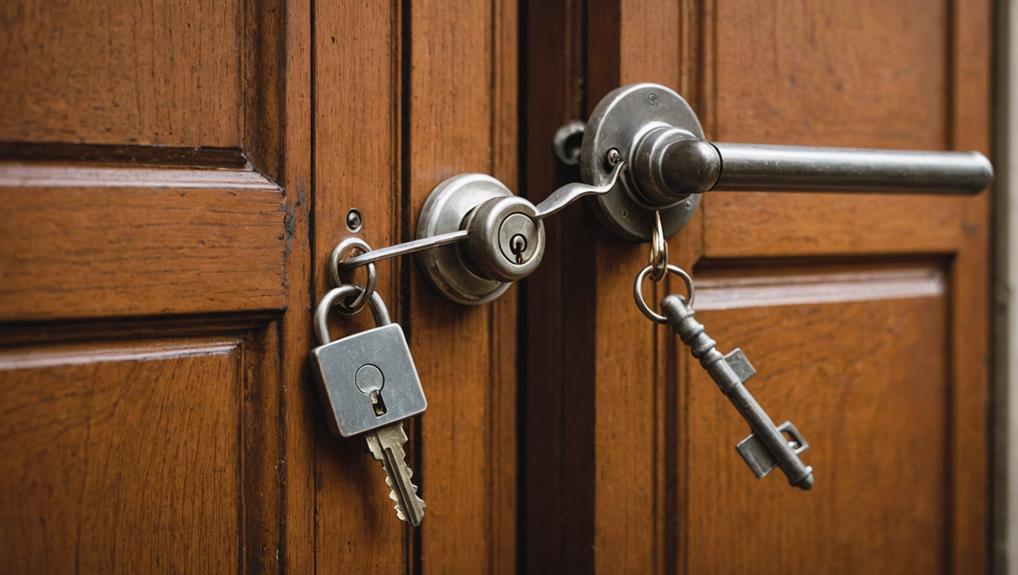
When it comes to home security, conventional locks stand out for their reliability and time-tested performance. Businesses also benefit from regular lock replacements, as outdated or worn locks can compromise security and leave properties vulnerable. You can trust these locks to protect your home, providing a sense of security that many appreciate.
Unlike smart locks, they don't depend on batteries or complex technology, which means you won't have to worry about them failing due to a dead battery or a software glitch.
Conventional locks are straightforward in their design and function. You insert a key, turn it, and your door is locked or released. This simplicity offers peace of mind, especially for those who prefer a no-fuss approach to home security. You can easily replace or rekey these locks without needing specialized skills or tools, making them accessible for anyone.
Additionally, essential lock replacement for business security is vital for maintaining a safe environment.
Moreover, conventional locks come in various styles and strengths, allowing you to choose what best fits your needs. You're serving your home and loved ones by opting for a reliable option that's proven to work effectively over the years.
Ultimately, conventional locks provide a solid foundation for your home's security, ensuring that you can focus on what truly matters—serving and protecting your family.
Security Comparisons
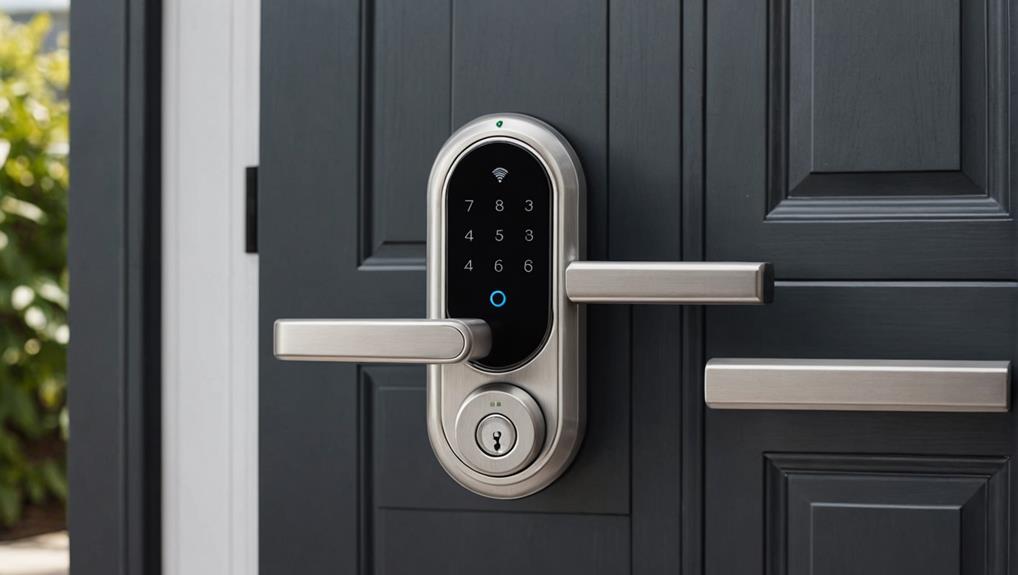
Comparing security options reveals distinct advantages and drawbacks between smart locks and conventional locks. Both have unique features that can suit your needs and those of the people you care about.
Smart locks often come with higher upfront costs, including installation and potential maintenance fees, which can be a consideration for those on a budget. A cost comparison guide may help you understand the financial implications better.
- Access Control: Smart locks let you grant access remotely, perfect for guests or service providers. Conventional locks require physical keys, which can be lost or duplicated.
- Monitoring: With smart locks, you can monitor entry and exit times, ensuring you know who's coming and going. Conventional locks don't offer this visibility.
- Alerts: Smart locks can send you alerts if someone tries to tamper with them. Conventional locks provide no such notifications, leaving you unaware of potential breaches.
- Emergency Access: In emergencies, smart locks often allow for temporary codes, giving quick access without needing to find keys. Conventional locks require physical keys, which mightn't always be on hand.
While both options have their merits, choosing the right lock depends on your lifestyle and how you prioritize security for yourself and those around you.
The key is to weigh these aspects carefully, ensuring you make an informed decision that best serves everyone's safety.
Cost Analysis of Smart Locks
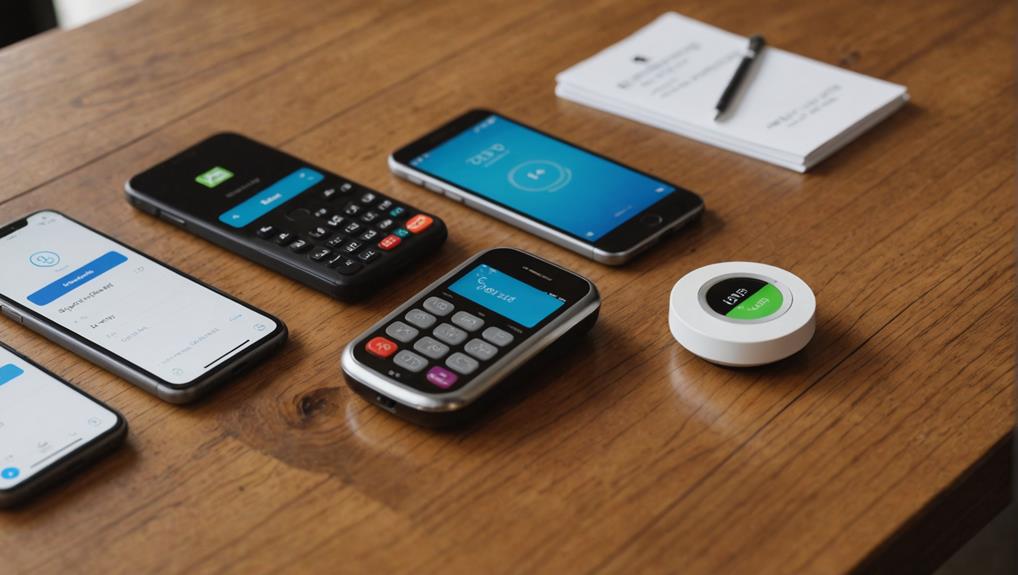
Investing in smart locks involves more than just the purchase price; it's important to evaluate ongoing costs as well. While the initial investment can range from $100 to $300, depending on the brand and features, you should also consider additional expenses.
Many smart locks require a Wi-Fi connection or a dedicated hub, which may lead to costs associated with upgrading your network. Additionally, user experiences indicate that while smart locks offer convenience through features like remote access, they can sometimes face connectivity issues that may impact reliability user experience of smart locks.
You might also face subscription fees for premium features, such as cloud storage for access logs or remote monitoring. These services can range from $5 to $15 per month, so it's wise to factor these into your budget.
Moreover, smart locks might need regular battery replacements, which can add another $20 to $30 each year depending on usage.
When evaluating whether smart locks fit your financial goals, think about the long-term value they bring. Consider the time savings, increased security, and convenience they offer to you and your loved ones.
User Experiences and Reviews
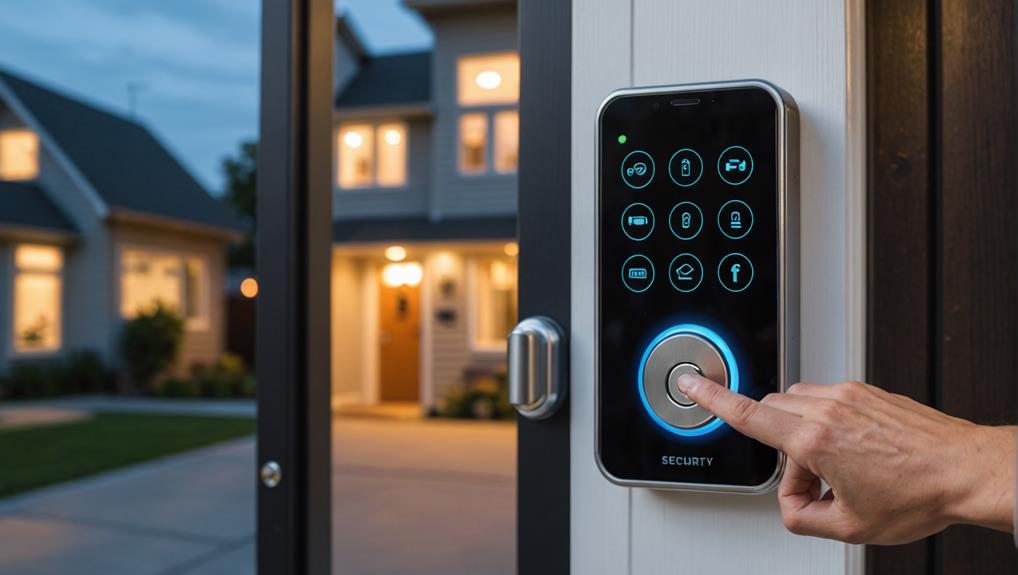
Many users appreciate the convenience that smart locks offer, noting features like keyless entry and remote access as significant advantages.
They love how these locks can simplify their lives, especially when it comes to serving family and friends.
Additionally, many smart locks can be re-keyed to guarantee compatibility with traditional keys, which adds an extra layer of flexibility and security for homeowners re-keying smart locks.
Here's what you might hear from satisfied users:
- Keyless Entry: Forgetting keys becomes a thing of the past, making it easier for guests to access your home.
- Remote Access: You can lock or open your door from anywhere, giving peace of mind when you're away.
- Guest Access Codes: Easily grant temporary codes for visitors, so you don't have to worry about spare keys.
- Activity Logs: Monitor who enters and exits your home, which can be helpful when you have service providers.
Frequently Asked Questions
Can Smart Locks Be Hacked or Compromised Easily?
Yes, smart locks can be hacked or compromised, especially if they're not properly secured.
If you don't use strong, unique passwords or keep your software updated, you're increasing the risk. Additionally, some models have vulnerabilities that hackers can exploit.
To protect yourself, always choose reputable brands, enable two-factor authentication, and regularly check for firmware updates.
Do Smart Locks Require a Wi-Fi Connection to Function?
Think of smart locks as a bridge connecting your home to modern technology.
They don't always need a Wi-Fi connection to function; many can operate using Bluetooth or even traditional keys.
However, if you want to access features like remote locking or monitoring, a Wi-Fi connection is essential.
How Long Do Smart Lock Batteries Typically Last?
Smart lock batteries typically last anywhere from six months to two years, depending on usage and the model you choose.
You'll want to monitor the battery level regularly to avoid any surprises. Many smart locks will send you alerts when the battery's running low, so you can replace them in time.
Are Smart Locks Compatible With All Door Types?
Did you know that about 70% of homes in the U.S. have doors that can accommodate smart locks?
While many smart locks fit standard door types, compatibility can vary based on your specific door's thickness, hardware, and deadbolt style.
It's crucial to check the manufacturer's specifications for your chosen smart lock to guarantee it works seamlessly with your door.
That way, you can enhance security while serving your home's needs effectively.
What Happens if the Smart Lock's Technology Fails?
If the smart lock's technology fails, you might find yourself locked out or unable to secure your home.
It's essential to have a backup plan in place. You can keep a traditional key handy or choose a smart lock with a manual override feature.
Regularly check the lock's battery and firmware to minimize failures. Staying proactive guarantees you can help others and maintain a safe environment, even when technology lets you down.
Conclusion
In the battle between convenience and security, smart locks shine like a beacon, offering you a world of effortless access and control. They let you open your door from a distance, turning your smartphone into a key. However, traditional locks stand strong, rooted in reliability. Weighing the costs and benefits is like choosing between a sleek sports car and a sturdy SUV—both have their merits. Ultimately, it's about what fits your lifestyle and peace of mind best.

